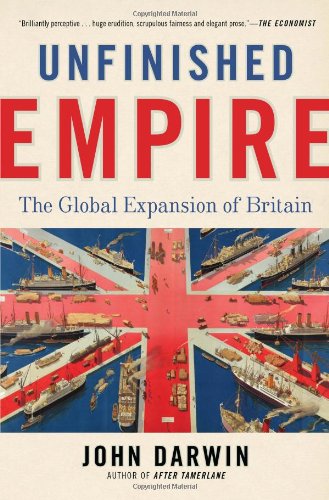
Unfinished Empire
The Global Expansion of Britain
- اطلاعات
- نقد و بررسی
- دیدگاه کاربران
نقد و بررسی

October 15, 2012
Nostalgic Brits esteem the Empire as a redemptive “civilizing mission,” others as an exercise in greed on a global scale. Oxford historian Darwin (After Tamerlane) argues convincingly that it was an ad hoc, largely private enterprise pursued by traders, migrants, soldiers, missionaries, and entrepreneurs with sporadic official support from the Crown. The book begins with Elizabethan England, at the time an outsider on the world stage: Spain enjoyed a “silver-rich empire” in the Americas; Holland controlled Asian spice islands; and Portugal had an outpost on the west coast of India. But by 1700, an “English Atlantic” was prospering with settlements strewn from Jamaica to Newfoundland, and though colonists played a minor role in Asia, traders there used military aid to assume control of the Indian subcontinent. By century’s end, America had broken free, but the defeat of France at Waterloo in 1815 ushered in a golden age of trade and enlargement for the U.K. Though U.S. and German economies surged around the dawn of the 20th century, British expansion continued until WWII, when the unwieldy and far-flung agglomeration of territories began to finally break free from the shackles of colonialism. Temporally and geographically sprawling, Darwin’s study is as expansive as his subject, yet his lucidly rendered project holds together remarkably well. Maps, illus. Agent: Adam Eaglin, the Wylie Agency.

November 1, 2012
A sweeping, nondogmatic study of the gradual and not always secure development of the British Empire. Darwin (After Tamerlane, 2007, etc.) looks fairly at both sides of the scholarly debate over the rightness of British imperialism, as both a civilizing force and imposition of a "cruel yoke of economic dependency." Versatility seemed to be the key to Britain's success in fashioning mercantile strongholds in the Americas, Middle East, India, Southeast Asia, China and Africa. The Tudor conquest of Ireland imparted some rough, lasting lessons in British territorial security, while British seamen, latecomers to Atlantic exploration, played catch-up against the exclusionary Spanish, Portuguese and Dutch, insisting on the universal right of "freedom of the seas." Private entrepreneurs, such as the leaders of the companies that first made contact in Virginia, West Africa and India, took the first steps; from possession by government charter, the privateers needed protection and assurance from London in luring settlers to the regions who would then enjoy the same civil rights as they had at home. Darwin moves steadily from this "assertion of sovereignty" to annexation to resorting to war in order to retain possession and quell rebellion, with more or less success (read: American colonies). The author does an excellent job delineating the remarkable British rule in India, which succeeded by "sheer bureaucratic persistence." Scottish missionary David Livingstone's formula for empire success--"commerce, Christianity and civilization"--gives a good idea of the myriad evolving colonies Darwin pursues in this vigorous but restrained historical survey. An evenhanded, erudite book that finds the work of empire building more nuanced than catastrophic.
COPYRIGHT(2012) Kirkus Reviews, ALL RIGHTS RESERVED.




دیدگاه کاربران